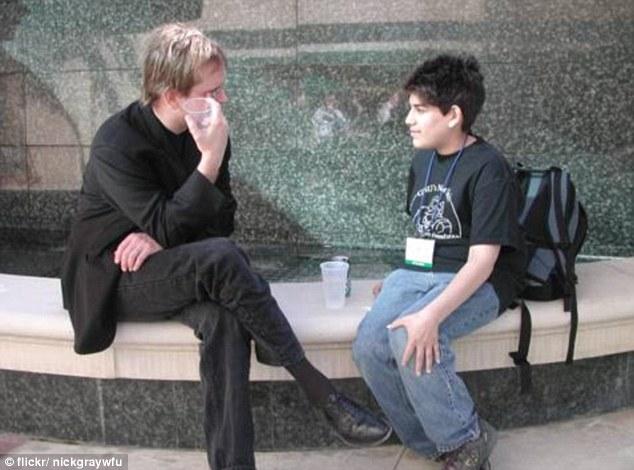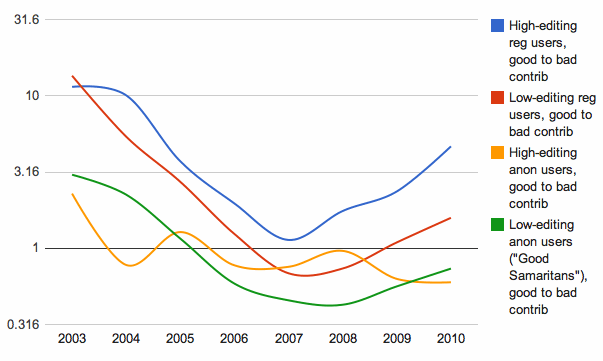About
Aaron Swartz was an internet activist, computer programmer and political organizer known for his involvement in several web projects including the Rich Site Summary (RSS) 1.0 and Infogami, which later became part of Reddit, as well as in online activism through his political action group Demand Progress.
Online History
Aaron Swartz began building web sites and applications at age thirteen[4], starting with a website called the Info Network[10], an unintentional clone of Wikipedia for which he won the 2000 ArsDigita Prize. Following this achievement, Swartz built a program that would collect news from different web pages and put them into one place for the reader. He used this work to join the RSS-DEV Working Group and collaborated on the release of RSS 1.0[1] in December 2000.

Political activist Lawrence Lessig with Swartz, age 14
Infogami
After attending Stanford University in California for a year, Swartz received funding through Y Combinator[12], a program dedicated to help entrepreneurs build fledgling companies, and launched the startup Infogami[11] in the summer of 2005. Though Infogami was later used as the basis for the ebook database Open Library[13], at the time, Swartz was unsure of where to go with the startup. At the suggestion of Y Combinator organizers, Swartz merged Infogami with Reddit in November 2005 and stayed with the company through its buyout from Conde Nast, after which he moved to San Francisco and worked in the offices of Wired magazine, where he became unhappy and suicidal before he was asked to resign in January 2007.[4]

Swartz, shown far left, working at Y Combinator
Wikipedia
Swartz was also closely involved with Wikipedia as a voluntary editor and ran for the Wikimedia Foundation’s Board of Directors in 2006. That same year, he wrote Who Writes Wikipedia[14], an analysis of Wikipedia’s community research process and the distribution of contributions across the editors’ community. In the report, Swartz concluded that the majority of content comes from tens of thousands of casual “outsider” contributors, while a core group of 500 to 1000 regular editors tend to focus on formatting aspects. His analysis contradicted Jimmy Wales’ theory that the core group of editors are the primary research contributors, which resulted from counting the total number of characters added by an editor, as opposed to the total number of edits that were taken into consideration by Wales.
Demand Progress
In 2010, Swartz launched Demand Progress[3], a tax-exempt organization dedicated to launching petitions to protect the freedom of the Internet. The organization has led numerous campaigns[31] including protecting whistleblowers, stopping politicians from trying to shut down WikiLeaks and fighting against the the Protect IP Act. Following the defeat of the Stop Online Piracy Act (SOPA), Swartz gave the following keynote in May 2012.
Legal Issues
PACER
In August 2009, Swartz learned he was wanted by the FBI[15] for allegedly downloading 20% of the records on the U.S. Government’s Public Access to Court Electronic Records (PACER) database in 2008. At the time, PACER was charging 8 cents per page to access documents that are not subject to copyright and are in the public domain. The FBI found that he had downloaded more than 18 million pages of documents worth $1.5 million dollars while it was in a free trial at local libraries, leading to them doing a thorough background check on Swartz in addition to staking out his home. The documents were later donated to Public.Resource.Org[16], an organization spearheaded by Carl Malamud[17] to keep free information free. After Swartz declined to speak with the FBI about the situation in April 2009, the investigation ceased.[18]
JSTOR Lawsuit
On July 19th, 2011, Swartz was indicted in a Boston court alleging that he stole more than 4 million documents from the Massachusetts Institute of Technology and journal archive JSTOR.[19] Prosecutors claimed that the files were downloaded with the intent of being made available for free on P2P sharing sites.[21] Swartz pleaded not guilty and JSTOR stated[22] that they would not be pursuing the legal matter. The act was likened to borrowing too many books from the library[23] with a sentence that was more severe than those reserved for people who commit manslaughter, rob a bank, sell child pornography or help al-Qaeda develop a nuclear weapon.[24]
Personal Life
Swartz stayed in public schooling up until his freshman year of highschool, when he started homeschooling and a mixed set of college courses. After a few years of community college courses, he went on to study at Stanford University in California. He left after only a year, dissatisfied with the atmosphere the school provided. Shortly after, he moved to Cambridge and began to work on the predecessor of Reddit. Interests spanning over politics, media, public opinion, and more led him to become involved in responding and writing a large number of online opinion blogs. Those same interests further pushed him to study at the Harvard Ethics Center as a Harvard Fellow.[32]
Death
On January 11th, 2013, two days after he was offered a settlement requiring him to plead guilty in the JSTOR case[27], Aaron Swartz committed suicide[5] at his home in Brooklyn, New York. His family launched a memorial site[26] and later released a statement[25] citing pressure from attorneys combined with a lack of support from MIT as factors in his death. There was an outpouring of grief online from tech bloggers, JSTOR[7], and internet researchers, who began making their works available for free online with the hashtag #pdftribute[8] in his honor. Additionally, members of Anonymous hacked into MIT websites, leaving messages messages in Swartz’s memory.[30] There were more than 200,000 tweets made about him in the two days following his death.[28] On January 14th, MIT announced an investigation into the school’s involvement with Swartz’ death[29] and the government formally dropped all charges against him.[20]
Search Interest
External References
[2]Aaron Swartz – Introducing Infogami
[4]Aaron Swartz – How to Get a Job Like Mine
[5]The Tech – Aaron Swartz commits suicide
[6]A legal analysis of the Swartz case made by one of the experts brought in to testify for him – The Truth about Aaron Swartz’s “Crime”
[7]JSTOR– Statement of regret
[8]CNET– Researchers honor Swartz’s memory with PDF protest
[9]We the People petition – Remove United States District Attorney Carmen Ortiz from office for overreach in the case of Aaron Swartz
[10]The Info Network – Archive from June 2000
[12]Wired – Stars Rise at Startup Summer Camp
[14]Aaron Swartz – Who Writes Wikipedia?
[15]Aaron Swartz – Wanted by the FBI
[17]Wired – Online Rebel Publishes Millions of Dollars in U.S. Court Records for Free
[18]Wired – FBI Investigated Coder for Liberating Paywalled Court Records
[19]New York Times – Internet Activist Charged in M.I.T. Data Theft
[20]Ars Technica – Government formally drops charges against Aaron Swartz
[21]Yahoo! News – Feds: Harvard fellow hacked millions of papers
[22]JSTOR– JSTOR Statement: Misuse Incident and Criminal Case
[23]Daily Caller – Reddit co-founder Aaron Swartz commits suicide at age 26
[24]ThinkProgress – Aaron Swartz Faced A More Severe Prison Term Than Killers, Slave Dealers And Bank Robbers
[25]Ars Technica – Family blames US attorneys for death of Aaron Swartz
[26]Remember Aaron Swartz – Home
[27]Macleans – Techno-McCarthyism and the death of Aaron Swartz
[28]Topsy – Tweet statistics for “aaron swartz”
[29]BoingBoing – MIT president appoints Hal Abelson to investigate university’s role in Aaron Swartz’s prosecution
[30]Washington Post – Anonymous hacks MIT sites to post Aaron Swartz tribute, call to arms
[31]Demand Progress – Campaigns
[32]LA Times – Aaron Swartz dies at 26; Internet folk hero founded Reddit
